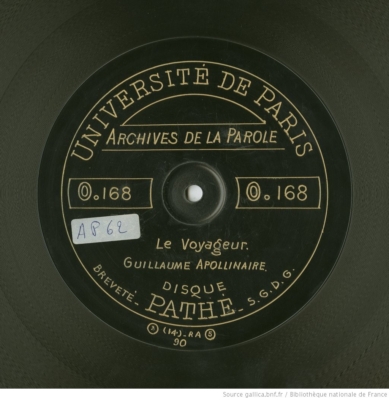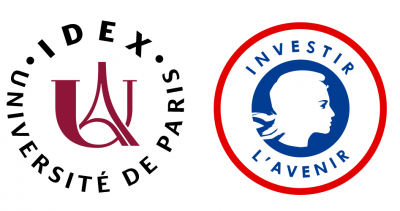Archives sonores de la poésie. Émergence IdEx project carried by Abigail Lang (2020-2022).

Apollinaire, “Le voyageur”, enregistré le 24 décembre 1913 par Ferdinand Brunot pour les Archives de la Parole, disque Pathé. https://gallica.bnf.fr
The Archives sonores de poésie project aims to inventory, archive, broadcast and analyze audio and video recordings of French-language poetry. A project with a heritage and a scientific component, it seeks to create the reference site for French-language poetry recordings and to organize an emerging field of research.
Sponsored by the Université de Paris IdEx and the ObTIC project team at Sorbonne Université, hosted by Huma-Num, the Archives sonores de poésie website will offer audio and video recordings of readings and interviews as well as all related documentation. It will also provide the necessary resources to contextualize these archives as well as bibliographies and links. All files will be provided with harvestable metadata (semantic web) and accessible online and downloadable in compliance with legal requirements. Intended for researchers, amateurs, teachers and students, these resources will help renew the access to and consumption of poetry. The heritage component of the project aims to identify and safeguard endangered collections and to enhance the archives of foremost cultural institutions by providing scholarly expertise (Centre Pompidou, cipM, Ina, MAM Paris, libraries, festivals…).
The scientific component of the project invites literary studies to rethink their scope and means by taking better account of the oral manifestations of literature. It will engage in close listening, research the history of delivery styles and that of archives of recorded poetry, notably online. Undertaking a history of recorded poetry at the crossroads of literature, technology and culture will renew the history of twentieth-century poetry. Establishing both qualitative and quantitative methods for the analysis of the spoken voice will require interdisciplinary and international collaborations with a comparatist impact, as well as local cooperation within the Humanities faculty, with Sciences (LIPADE), with Libraries (SCD) and the digital humanities center (CHN) under construction. Developing collaborative annotation features of online resources will contribute new avenues for academic reading and writing practices.
Keywords: archive; digital humanities; partnership with cultural institutions; history of recorded poetry; speaking voice analysis; literature and technology; practice-based research; academic reading and writing practices; structuring collaboration.

